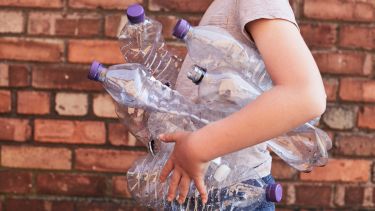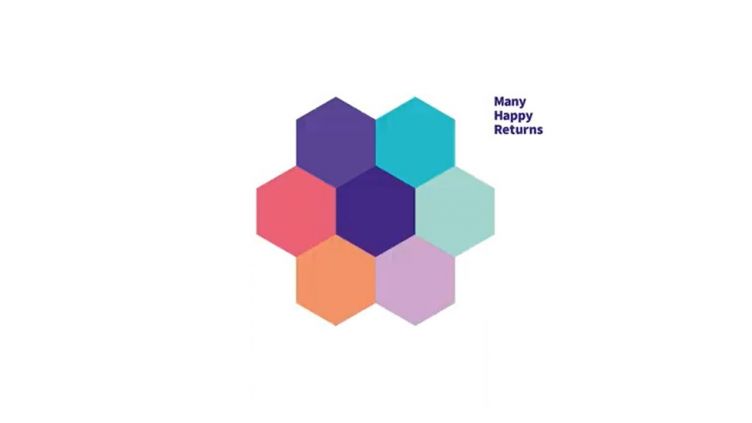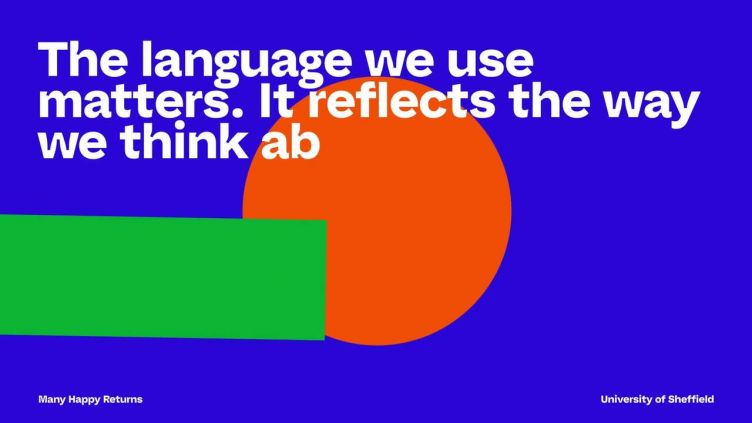The power of language in a plastic waste crisis
Only 45 percent of plastic in the UK is successfully recycled. Research led by Professor Joanna Gavins highlights how language can be used to shape positive behaviours and change our relationship with plastic.

Plastic is everywhere. Invented in 1907, the material is lightweight, strong and affordable and found in many everyday products ranging from water bottles and food containers to cutlery and medical equipment.
According to National Geographic, nearly a million plastic beverage bottles are sold every minute around the world. But plastic can take anywhere between 20 and 500 years to break down and is one of the largest contributors to the pollution damaging the earth’s ecosystem.
The UN Environment Programme found that 300 million tonnes of plastic, or the equivalent of the total weight of the human population, is produced every year. Discarded plastic is a growing pollution problem with more than 6.3 billion tonnes of plastic waste generated as of 2015, leading to 1 in 3 fish caught for human consumption now containing the material.
Most types of plastic are recyclable however a report by the Organisation for Economic Co-operation and Development (OECD) found that the world is producing twice as much plastic waste as it was two decades ago and only 9 per cent is successfully recycled.
With over half of UK households choosing to put one or more items in the general rubbish rather than recycling, researchers at ∫˘¬´”∞“µ are taking a linguistic approach to understand how to change the nation‚Äôs throwaway culture.
A reuse system is no good if people don’t use it. We quickly realised that scientific, technological and engineering solutions for plastic pollution can't tackle the problem alone.
What really matters is behaviour change and encouraging more people to take up systems of reusing, before recycling. But to encourage this change you have to understand the benefits of reusing plastic and this can be done through language.
Professor Joanna Gavins
Co-Investigator of Many Happy Returns
Challenging recycling: A multidisciplinary project
Many Happy Returns (MHR) was a £1m multidisciplinary research project funded by UK Research and Innovation through the Smart Sustainable Plastics Packaging Challenge (as part of the Industrial Strategy Challenge Fund), that aimed to find solutions to existing issues with plastic packaging, reduce plastic pollution and unlock barriers to create fundamental changes in the industry.
The project brought together experts from across four faculties at the University to study the extent to which the public’s understanding of single-use plastic is aligned with the messaging of organisations.
With a focus on how humans conceptualise and experience language, Co-Investigator Professor Joanna Gavins led the linguistics work on understanding and changing society’s behaviour towards single-use plastic.
Analysing 4.5 million words of language
Language affects people’s behaviour and can be used to promote changes in thinking. The project studied the extent to which the public’s understanding of single-use plastic is aligned with the messaging of organisations such as manufacturers and food retailers.
The team collected linguistic data to see how people talk about plastics in their everyday lives and the motivations behind reusing and recycling. They gathered over 4.5 million words - from packaging and advertising, local council guidance, and consumer language on social media platforms, to evaluate different perceptions of plastic usage.
“We found that while most people wanted to reduce their plastic usage, they felt powerless and unable to do so. Many supermarkets provide goods in single-use packaging that consumers didn’t necessarily ask for in the first place. There was a strong sense of frustration from consumers who felt like they were being blamed for something they had little control over” explains Professor Joanna Gavins.
“Unsurprisingly, our research highlighted an uncomfortable relationship between retailers and individuals due to language choices that didn’t land well with consumers. Many supermarkets use words such as helping, supporting and providing in their communications but these sentiments weren’t felt by the general public, causing a detachment between brands and consumers. We’re now producing a guide to support organisations in using language that will engage consumers and encourage them to adapt positive behaviours such as reusing a plastic item more than once” she adds.
Yes, it’s plastic, but...
In 2022, the research findings were transformed into an interactive art installation titled ‘Yes, it’s plastic but…’ for the . The project collaborated with artist Lynne Chapman to present contradicting thoughts and beliefs surrounding plastic to the general public and encourage reflection on what it means to be environmentally friendly.
“Lynne was fantastic at creating a visual representation of some of the consumer frustrations we found at the core of the research. It was important for us to share our findings with the public to communicate the role that our behaviour has on impacting and understanding single-use plastic pollution” says Professor Joanna Gavins.
“We also worked with sound engineer and musician to create a soundscape of real quotes by people taken from our research findings. It was really important for us to rehumanise the data taken from online forums and shape it into a natural interaction which is full of opinion and passion. Sometimes when you take the langage out of context and start to analyse it you can lose a bit of that humanity. This interactive exhibition brought back to life people’s true emotions around single-use plastics and placed it back at the heart of the project” she adds.
Supporting organisations
Based on their research findings, the team developed a guide to circulate to every local council in the UK, as well as supermarkets and plastics manufacturers nationally and internationally. Titled ‘How to talk about Plastics’, the document provides guidelines on how to use language to reduce plastic pollution without falling into the trap of greenwashing.
“We wouldn’t have had the Covid vaccine without plastic, plastic is everywhere and we can’t live in a world without it. We’ve got to come to some kind of peace with our relationship with plastic and cherish and look after plastic materials more, but a lot of the time this isn’t an easy message to get across” says Professor Joanna Gavins.
“The interdisciplinary nature of this project has been fundamental to evidencing society’s attitudes and behaviours towards plastic. I’m fortunate to work in an institution where linguistics is valued as much as science and engineering and hope our work together will drive business and behaviour change to reduce unnecessary plastic waste” she adds.
The study is part of ongoing research on the Many Happy Returns project that continues to investigate UK discourses around the themes of plastic packaging and reuse.
Earlier this year, the team , which explored our relationship with plastic. Over three episodes, Professor Joanna Gavins spoke to experts from a range of different academic disciplines to understand how plastic became such an integral part of modern life, and how research might help us live with plastics more responsibly and more sustainably.
Read the guide: How to Talk ∫˘¬´”∞“µ Plastics
Written by Alina Mironova, Marketing and Communications Officer.
For further information contact:
mediateam@sheffield.ac.uk




